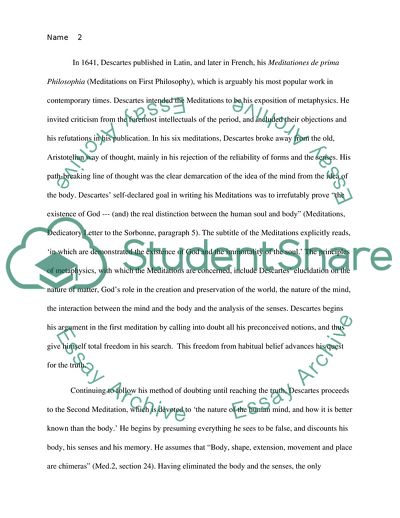Cite this document
(Descartes: Mind over Body Essay Example | Topics and Well Written Essays - 1750 words, n.d.)
Descartes: Mind over Body Essay Example | Topics and Well Written Essays - 1750 words. https://studentshare.org/philosophy/1721522-taking-into-account-its-context-in-the-meditations-evaluate-descartes-argument-about-the-piece-of-wax-indicating-in-your-analysis-what-this-example-is-meant-to-illustrate-and-if-it-is-successful
Descartes: Mind over Body Essay Example | Topics and Well Written Essays - 1750 words. https://studentshare.org/philosophy/1721522-taking-into-account-its-context-in-the-meditations-evaluate-descartes-argument-about-the-piece-of-wax-indicating-in-your-analysis-what-this-example-is-meant-to-illustrate-and-if-it-is-successful
(Descartes: Mind over Body Essay Example | Topics and Well Written Essays - 1750 Words)
Descartes: Mind over Body Essay Example | Topics and Well Written Essays - 1750 Words. https://studentshare.org/philosophy/1721522-taking-into-account-its-context-in-the-meditations-evaluate-descartes-argument-about-the-piece-of-wax-indicating-in-your-analysis-what-this-example-is-meant-to-illustrate-and-if-it-is-successful.
Descartes: Mind over Body Essay Example | Topics and Well Written Essays - 1750 Words. https://studentshare.org/philosophy/1721522-taking-into-account-its-context-in-the-meditations-evaluate-descartes-argument-about-the-piece-of-wax-indicating-in-your-analysis-what-this-example-is-meant-to-illustrate-and-if-it-is-successful.
“Descartes: Mind over Body Essay Example | Topics and Well Written Essays - 1750 Words”. https://studentshare.org/philosophy/1721522-taking-into-account-its-context-in-the-meditations-evaluate-descartes-argument-about-the-piece-of-wax-indicating-in-your-analysis-what-this-example-is-meant-to-illustrate-and-if-it-is-successful.


